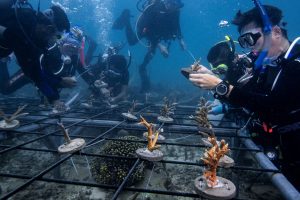Carbon cycle feedbacks
The response of the carbon cycle remains a key uncertainty in future climate projections.
Each year the oceans and terrestrial biosphere remove around half of all anthropogenic emissions of CO2, whether this will continue in the future is uncertain. If these sinks do not keep pace with emissions and a larger fraction of emitted CO2 remains in the atmosphere, more aggressive mitigation strategies will be required to keep temperatures below agreed targets. TerraFIRMA will combine models and observations to constrain key, uncertain carbon cycle processes in UKESM models. It will also examine the efficacy of land-based mitigation strategies, assessing the role forests play in climate change mitigation and the permanency of carbon uptake by the terrestrial and marine sinks.

Credit: Giacomo d’Orlando / Climate Visuals
The ocean acts as a major sink of excess heat and carbon dioxide, driving sea-level rise and ocean acidification. The size and distribution of these impacts are presently uncertain. TerraFIRMA will use complementary approaches to (i) quantify these uncertainties in current Earth system models and (ii) investigate how additional biogeochemical process complexity affects them.
Land Use for climate change mitigation: Realizing the Paris Agreement requires the use of carbon dioxide removal technologies. Biomass energy with carbon capture and storage (BECCS) and afforestation are the most widely considered land-based technologies. TerraFIRMA will run experiments to investigate the consequences of increasing global tree cover in a changing climate and the potential of land use to mitigate climate change through carbon uptake.